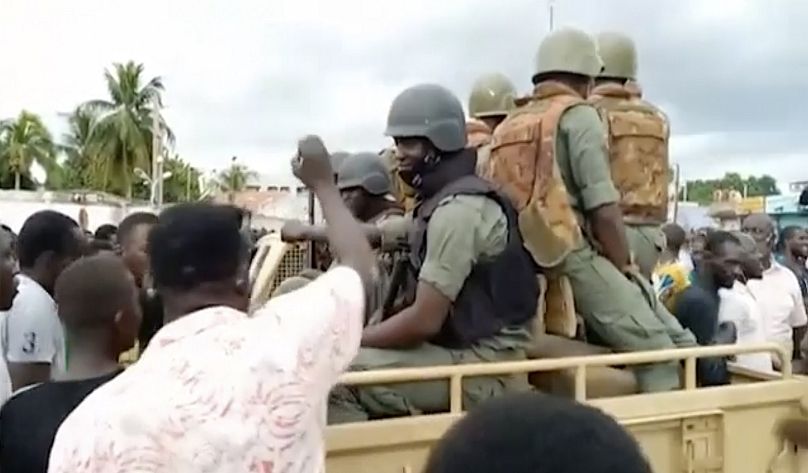Events in Mali could have a ripple effect across West Africa, and heighten issues such as poverty and terrorism.
On Tuesday, jubilant crowds packed the streets of Mali's capital Bamako, waving flags amid blaring horns and gunfire, hailing what they saw as the start of a new chapter in their country's history.
Under duress from the country's military, President Ibrahim Boubacar Keïta and Prime Minister Boubou Cissé had resigned before being detained by soldiers.
By Thursday, a new military junta - calling itself the National Committee for the Salvation of the People - was installed, promising new elections and a new confidence between the people and government.
While Mali has long been held up as the epitome of a vibrant African democracy, the country has often made headlines for the terrorism that has plagued it.
But the unfolding coup, which has been the culmination of weeks of unrest in the West African nation after a disputed election, has this week sent ripples across the world.
So, what does the coup mean for Malians and why should we be paying attention?
An unstable region
Speaking at a press conference on Wednesday, President of the European Council Charles Michel said that events in Mali could have a "destabilising effect on the entire region."
"We are extremely concerned by developments. We believe that the stability of the region and Mali, and the fight against terrorism should be an absolute priority, and we would call for the immediate freeing of prisoners and for a return to the state of law," he said.
"We also believe that we should continue with our efforts at close cooperation with the various institutions - the African institutions - involved so that we can come to a solution which is directly linked to the aspirations of the Malian people."
Michel is not alone in voicing anxieties over the developing situation. The coup will likely have consequences for the stability of the whole Sahel region in West Africa. It also presents security concerns for the EU, the US and the Arab world, not least because it could cause a power vacuum that Islamist extremists with an already strong foothold in the country will seek to exploit.
France's "Forever War"
France, more than most European actors involved in anti-terrorism operations in the Sahel, has a vested interest in what happens in the country, a former colony.
Mali, having gained independence in 1960, was long held in high esteem for its democratic principles. Since 2012, however, the country has been rocked by a succession of violent confrontations with Islamic extremists after the military staged a coup.
Jihadis linked to Islamic State and al-Qaeda were able to capture many towns in the north of the country, imposing a strict interpretation of Islamic law on those living under their jurisdiction. This included the destruction of historic sites and forced marriages for women.
French military intervention in 2013 managed to dislodge the jihadis from major towns and cities but has, for the last seven years, failed to stop a resurgence.
And it has, of course, come at a cost for France; with 5,000 boots on the ground and 47 troops killed in operations, Mali has been dubbed France's "Forever War."
As well as ploughing French, German, Italian and American military resources into stabilising the country, the UN is currently spending €1 billion a year to maintain 15,000 troops.
At present, more than half of Mali's landmass is still occupied by armed groups of jihadis, with the influence of these groups now extending over the border into neighbouring Niger and Burkina Faso.
For those still living in areas still controlled by the government, the war has exacerbated conflicts within Malian society and uncovered rife corruption at the heart of the government, something which has angered many.
Eight years on, the coup now in progress shares many of the same hallmarks, including public unrest and ill-feeling towards the government. The junta now installed in Bamako is even believed to have originated from the same barracks of the 2012 coup leaders.
Deteriorating situation for Malians
While many in Europe and further afield see Mali with a degree of detachment, the war on terrorism raging within the country's borders is having an altogether different effect on those on the ground.
"The military coup in Mali comes on top of years of conflict and violence in the wider Sahel region that has trapped millions of people in crisis, " says Klaus Spreyermann, head of delegation for the International Committee of the Red Cross (ICRC) in Mali.
The crisis, which has now culminated in the forceful removal of the current government, has worsened of late due to a number of factors, not least the coronavirus pandemic.
"Violence has tragically escalated during the COVID-19 pandemic, driving death, injury and displacement, all while more than 18 per cent of health care facilities nationwide, 90 per cent of them in the north, have been destroyed by war," adds Spreyermann.
While President Keïta rode a wave of popular support in a landslide election victory in 2013, many now view him and his government with mistrust.
Having been forced into a run-off in the 2018 presidential election, Malians accused him of failing to quash corruption as he promised, even going so far as to accuse him of manipulating a parliamentary election in March.
"People in northern and central Mali have lived for years in a vicious cycle of conflict and climate shocks that have driven them from their homes and destroyed their livelihoods," says Spreyermann.
"Their needs must not be forgotten. It remains the responsibility of authorities to assist them, no matter the changes of leadership in Bamako."












